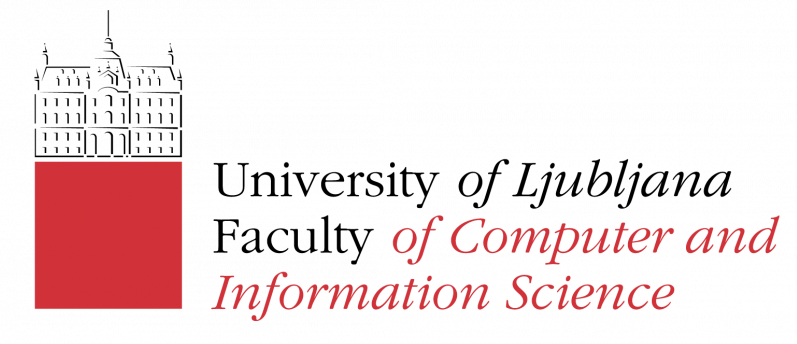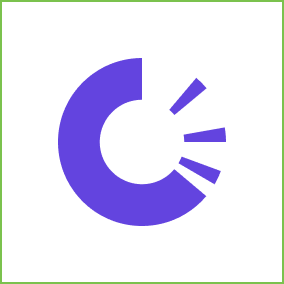
ABOUT THE PROJECT
OriginTrail DKG: Decentralised and Scalable Knowledge Graph Economy Tools Supporting the "Trusted, traceable and transparent ontological knowledge on blockchain — ONTOCHAIN"
With our project, we seek to propose a rounded approach adding to ONTOCHAIN’s distributed storage, core protocols and application protocols stack to facilitate transition from a broken data economy to a trusted, semantic, human-centric and privacy-by-design adopting knowledge economy.
Website: https://origintrail.io/
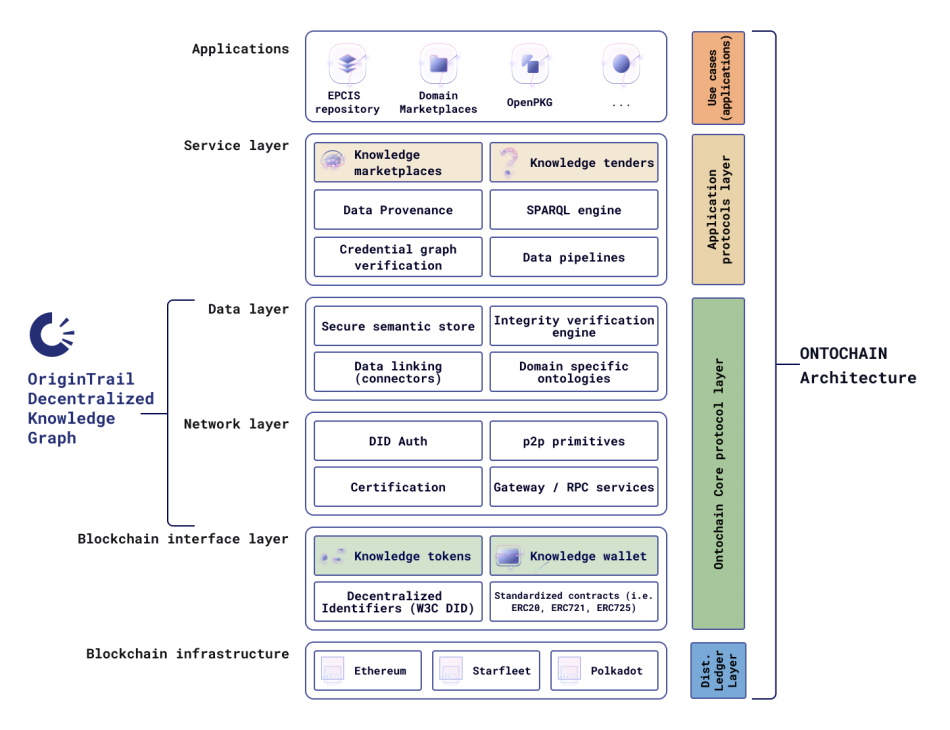
Motivation for the project:
The last two years were challenging in many ways and it also put a light on the currently broken state of the data economy. The only way we can achieve sustainability for such a data economy is by turning data into knowledge and enabling all, organisations and individuals, to take part in the upcoming knowledge economy in a sovereign, human-centric and privacy preserving fashion. With our project, we seek to propose a rounded approach adding to ONTOCHAIN’s distributed storage, core protocols and application protocols stack to facilitate transition from a broken data economy to a trusted, semantic, human-centric and privacy-by-design adopting knowledge economy. We are building our proposition on Trace Labs’ multiple years of work turning data into structured, connected and trusted knowledge with OriginTrail Decentralised Knowledge Graph (OriginTrail DKG).
Generic use case description:
The OriginTrail DKG proposal is aiming to vastly improve ways data and knowledge are being exchanged in a trustworthy, privacy-preserving and inclusive way in vital sectors such as supply chains, eScience, eCommerce, eInfrastructure and eEducation. This proposal is focusing on the Open Topic aiming to “Develop scalable blockchain, decentralized reputation systems and semantic web technologies, in order to achieve trustworthy content handling and information exchange as well as trustworthy service exchange in the next generation Internet/social networks for vital sectors of the European economy”.
Essential functionalities:
Crucial knowledge tools allowing of turning scattered, underutilized data into trusted knowledge to have a significantly larger impact are:
- Knowledge tokens: Knowledge tokens are built utilizing standardised cryptographic (fungible or non-fungible) tokens that act as access control tokens, while having all the characteristics of other cryptographic tokens (e.g. transferability and usability in smart contracts). Anyone holding certain knowledge which is valuable can create a kToken tied to it.
- Knowledge wallet: to keep ownership over one's knowledge - “own your keys, own your knowledge”. Initial prototypes of the concept have been implemented through the Decentralized EPCIS repository, developed together with the Swiss Railways SBB (at TRL4).
- Knowledge marketplace: A meeting place of the supply and demand for knowledge. It is a crucial mechanism that facilitates knowledge exchanges, especially in cases where stakeholders do not have a direct connection.
- Knowledge tenders: By defining key components of the required knowledge (specific domain ontologies, data models, identifier schemes, identity frameworks etc), participants in the Knowledge Economy can use knowledge tenders to crowdsource knowledge.
How these functionalities can be integrated within the software ecosystem:
OriginTrail Decentralized Knowledge Graph enables Ontochain core protocol functionalities of identity management and authorization, secure decentralized data storage, certification and knowledge graph semantic services such as verifiable data linking using cryptographic connectors. OriginTrail supports the necessary ontologies and data models such as GS1 CBV and EPCIS standards (to which the Trace Labs team also contributes in developing), and W3C promoted Web of Things, Verifiable Credentials and Decentralized identifiers. Multiple blockchains for the distributed ledger functionalities of Ontochain architecture, initially prototyping using Ethereum VM implementations of smart contracts, currency and identity primitives. However, as Trace Labs is part of the Substrate Builders program (Parity blockchain building framework), an additional implementation through a Substrate based blockchain will be explored (Starfleet).
Gap being addressed:
With our project, we seek to propose a rounded approach adding to ONTOCHAIN’s distributed storage, core protocols and application protocols stack to facilitate transition from a broken data economy to a trusted, semantic, human-centric and privacy-by-design adopting knowledge economy.
Expected benefits achieved with the novel technology building blocks:
The tools are particularly impactful for individuals and organizations who either have valuable data locked up or have been providing such valuable data to partners in their supply chain (or other business networks) without being compensated for the business value it generates.
We will thus enable individuals and organizations to, on one hand, unlock the dormant value of their data by turning it into knowledge and monetizing it, and on the other hand, access knowledge provided by other Knowledge Economy participants to generate business value. While the Incentivization Tools are built on the open-source OriginTrail technology, we will streamline the way individuals and organizations can utilize by introducing easy to use interfaces into nOS, which is already being used by enterprises like BSI and SBB. This will reduce the complexity and allow the Knowledge Tools to be used with existing as well as new customers and use cases. In other words, we will enable anyone, not only the tech-savvy, to benefit from Knowledge Tools and generate business value - for themselves and other Knowledge Economy participants.
Potential demonstration scenario:
We believe that sustainable interactions are only possible through enablement of trusted knowledge exchange. For that purpose, we will engage with some of our key partners (BSI, Swiss Federal Railways, Oracle, Parity Technologies and others) to validate the OriginTrail DKG approaches and tools. We will utilise our working relationship to ensure that our user interviews will be carried out with relevant stakeholders, increasing the chances of long-term success of the OriginTrail DKG and creating good grounds for dissemination activities.
PROJECT OUTCOMES
OriginTrail Decentralized Knowledge Graph’s (DKG) ability is to organize the most important assets, making them discoverable, verifiable and valuable. OriginTrail DKG is harnessing the power of two technologies, blockchain and knowledge graphs, to enable turning data into assets as well as building upon previous ONTOCHAIN topics.
The DKG introduces a powerful concept of Universal Asset Locators - persistent identifiers for all assets across any network. What URLs enabled for websites in Web2, UALs enable for assets in Web3. Builders seeking to leverage the DKG can use basic CRUT functionality (Create, Read, Update, Transfer) for Web3 Assets. In addition to enabling creation of ownable assets and their semantic representation, DKG has native semantic support, allowing you to empower your Web3 assets and applications using standardized linked data practices based on powerful tools such as RDF and SPARQL.
The core development team of OriginTrail, Trace Labs, has expanded the core functionality of the DKG in the ONTOCHAIN project to:
- align it entirely with ONTOCHAIN core protocol functionalities (identity management and authorization, secure decentralized data storage, certification and knowledge graph semantic services such as verifiable data linking using cryptographic connectors),
- Introduce a set of service-layer applications as a toolkit for builders of applications known as knowledge tools (kTools for short).
Demo:
Repositories:
https://github.com/ONTOCHAIN/DKG
Currently open to the ONTOCHAIN community only. Reach out if you need access.
Documentation:
kTools API specification (Swagger): https://app.swaggerhub.com/apis/TraceLabs/dkg-ktools/1.0.0
Official OriginTrail DKG documentation: https://docs.origintrail.io/
More details:
Use case Scenario
Scenario 1 - Builders
Teams and individuals creating Web3-native products and solutions (e.g., Metaverses, NFT marketplaces, Data marketplaces, Web3 social networks, Enterprise data exchange solutions…) can engage with the DKG and kTools toolkit to enhance their offering. Taking a Web3 social network example—DKG can be used to form assets of all “primitives” of a social network (profile, posts, comments, engagements, connections). Leveraging kTools several other functionalities can be enabled - kTokens for access to permissioned content, kWallet integrated to profiles for easier management of actions with DKG assets and Knowledge Marketplace to monetise content.
Scenario 2 - Asset creators
Asset creators can leverage the DKG and kTools to create evolvable assets. In the example of creating an NFT collection, each NFT asset can have an evolving function enabled by growing their assets (knowledge) graph. The kToken implementation can also allow NFT owners to create associated permissioned datasets (e.g., on their NFT usage in Metaverses, value appraisals, various experiences media content) access to which is managed by a token economy.
Scenario 3 - Asset consumers
Easing the way to find, verify and interact (e.g., buy) Web3 Assets, Asset consumers can use a Web3 explorer as their entry point into the Web3 omniverse. A cross-network decentralized search engine allows users to have a self-sovereign approach to discovery of assets. The OriginTrail DKG and kTools are also in no way prohibitive in use and allow for discovery functionality to be integrated in any number of general or topic-specific search engines.
ONTOCHAIN partners that support the scenario
NFT Swap - NFT monetization
Perun-X - Facilitating cross chain state channels
BOWLER - Advanced capabilities for extending/creating assets (NFTs)
NFT Watch - Ontologies and tools for semantifying NFTs
ADOS - Providing semantic data to generate NFTs out of physical assets
MFSSIA - Provenance trustability and legitimacy evaluation of respective NFTs
ONTOSPACE - Semantic operations within smart contracts
DESMO-LD - Semantic oracles
GEONTOLOGY - Providing geolocation verifiability for physical assets associated with NFTs
PRINGO - Common good asset tokenization & utilization services?
PS-SDA - Data provenance framework
Semantic content and content transfer
-
Support for generic semantic content
-
Ownership and update history
TEAM
Chief Technical Officer - led successful implementations of OriginTrail technology with various systems, integrated advanced features, and designed solutions with Ethereum, xDai, Polygon and Substrate blockchains.
Project Management - has worked as a senior consultant at DHL Consulting, helping large global firms with digital transformation.
Data Scientist & Machine Learning engineer - is a PhD candidate at University in Belgrade focusing on machine learning and advanced data modelling, focusing on the knowledge graph implementation over p2p networks and data pipelines.
User relations - experienced with managing relationships with different communities both European and global.
Quality Assurance Engineer - Software QA engineer focused on ensuring high quality software deployments with extensive experience in automated testing practices and CI/CD pipelines.
Lead Infrastructure Engineer - experienced with building high quality decentralized application interfaces based on OriginTrail and Ethereum for both open source and enterprise projects.
Digital Product Designer - has been designing user experiences in the field of blockchainbased applications since 2016 and has experience with user-centric tools, agile product development, videography, and 3D animation.
Blockchain Engineer - developing the OriginTrail protocol implementation based on Ethereum and Solidity programming language for 3+ years.
ENTITIES
Prospeh d.o.o. (Slovenia) and Prospeh BGD d.o.o. (Serbia)
Trace Labs pioneered the introduction of blockchain technology and ontologies (based on W3C and GS1 standards) to deliver semantic interoperability across supply chains and developed universal data exchange solutions for increasing trust in supply chains, and currently employs 5 people in Slovenia and Serbia with a strong background in blockchain.
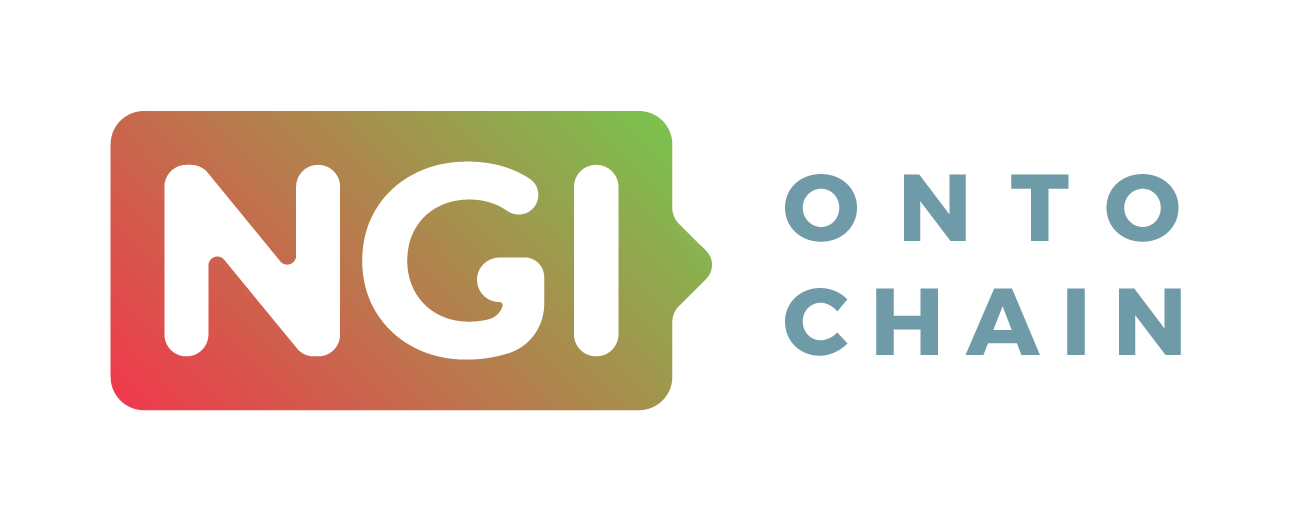
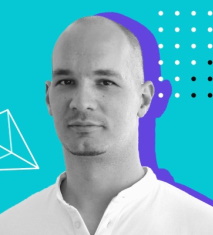








 This project has received funding from the European Union’s Horizon 2020 research and innovation programme under grant agreement No 957338
This project has received funding from the European Union’s Horizon 2020 research and innovation programme under grant agreement No 957338
